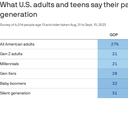Gen Z is less religious, less Republican than other generations, survey finds

Generation Z adults are less likely than older generations to join an established religion, far more likely to identify as LGBTQ and generally are less likely to be Republican, a new survey shows.
Why it matters: Gen Z — which includes those born between 1997 and 2012 — is the most racially and ethnically diverse generation in U.S. history, and an estimated 40.8 million Gen Zers will be eligible to vote in 2024.
The big picture: The survey by the nonpartisan Public Religion Research Institute confirms the left-leaning beliefs of Gen Z shown by other studies.
- It also gives more details about their identities and religious habits that reflect broader shifts in American culture.
By the numbers: Gen Z adults — who now make up about 1 in 6 of the Americans eligible to vote — are more politically left than older Americans, with 43% of them identifying as liberal, the survey found.
- With the exception of millennials, who were born between 1981 and 1996, Gen Z adults are notably less likely than those in other generations to identify as conservative.
- About 36% of Gen Z adults identify as Democrats, while only 21% say they're Republicans. About 30% say they are independents.
- More than half of Gen Z non-voting-age teens do not identify with a major party, but most share their parents' party affiliation.
Zoom in: Gen Z adults appear to be accelerating Americans' move away from Christianity and toward being unaffiliated with any religion — or religious "nones" — even as many conservative Republicans seek to inject more religion into schools and public life.
- Gen Z adults are notably less likely to identify as white Christians (27%) compared to baby boomers (54%), and more likely to identify as religiously unaffiliated (33%) than every generation except millennials.
- About 28% of Gen Z adults identify as LGBTQ, compared with 16% of millennials, 7% of Generation X (born 1965-1980), 4% of baby boomers (1946-1964) and 4% of the Silent Generation (1928-1945).
What they're saying: "Clearly, Gen Z does not like to be labeled, and they're not necessarily wanting to hang their hat with a particular political party these days," PRRI CEO Melissa Deckman told Axios.
- Even so, Gen Z women are "more likely to identify as Democrats than Republicans because there's no sense in the data that huge inroads are being made by the GOP with younger voters."
Yes, but: A poll released last month by the Institute of Politics at Harvard Kennedy School found that young Americans appear less likely to vote in 2024 than they did in 2020, a record-setting year for young-voter turnout.
- Before the 2020 election, 57% of Americans ages 18 to 29 said they were planning to vote. The number is now 49%, a figure many analysts say reflects disinterest in the likelihood of a Biden-Trump rematch.
- A few left-leaning Gen Z voters told Teen Vogue, who wrote about the poll that they might abstain rather than vote for Biden because of the president's support of Israel in its war with Hamas.
Of note: Most Gen Z Americans, particularly Gen Z Democrats, are more likely than older Americans to believe that generational change in political leadership is necessary to solve the country's problems, the PRRI survey found.
- About 58% of Gen Z adults (including 74% of Gen Z Democrats) agree that "we won't be able to solve the country's big problems until the older generation no longer holds power."
Methodology: The survey was conducted Aug. 21-Sept. 15ed by PRRI. The poll is based on a representative sample of 6,014 participants, including an oversample of teens 13-17 years old and adults 18-25 years old, living in all 50 states and the District of Columbia who are part of Ipsos' Knowledge Panel®.
- The margin of sampling error for those surveyed age 18+ is ±1.58 percentage points at the 95% confidence level, for results based on the entire sample.
- The margin of error for those surveyed age 13+ is +/- 1.51 percentage points at the 95% confidence level.